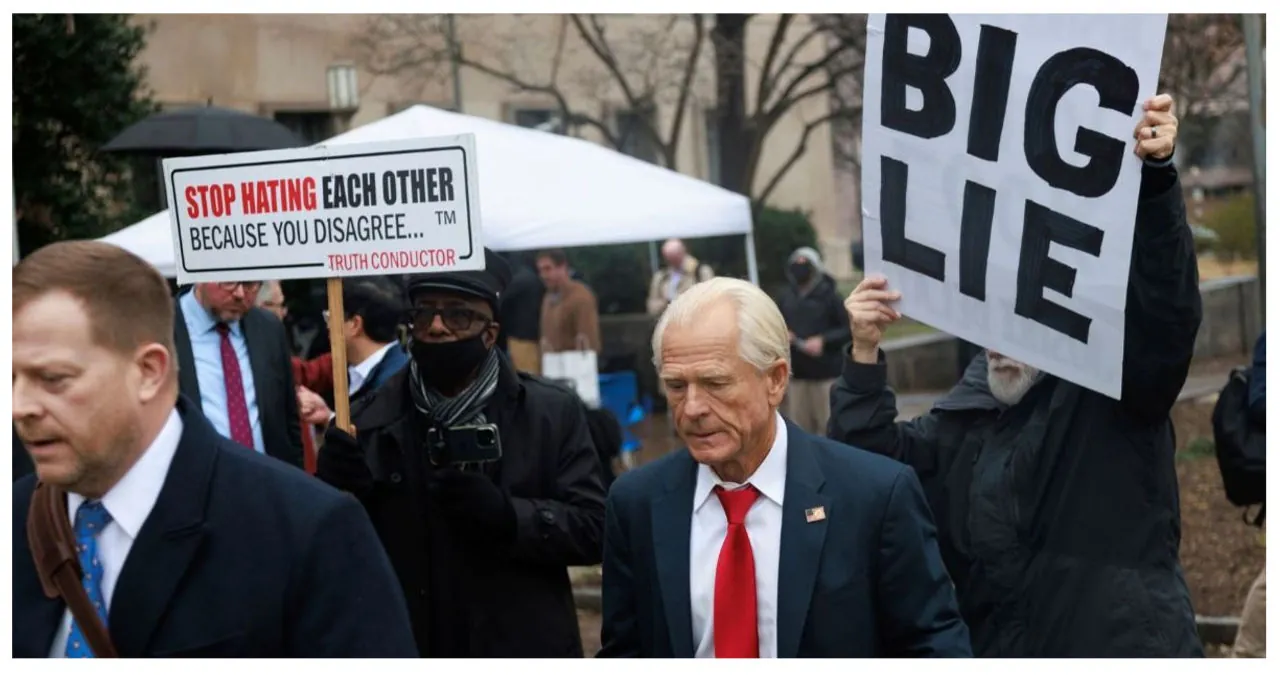Aiexpress – Peter Navarro, a former White House official during the Trump administration, exits the E. Barrett Prettyman Courthouse in Washington, D.C. on January 25, 2024. He has been sentenced to four months in jail for contempt of Congress during the investigation into the January 6 riots.
Fresh from serving a four-month sentence for two counts of contempt of Congress, Peter Navarro, former Trump White House trade adviser, finds himself facing potential trouble once more. This time, a federal judge has issued a warning, threatening to hold Navarro in contempt of court for his failure to return presidential records to the National Archives.
U.S. District Judge Colleen Kollar-Kotelly expressed her concern in a six-page opinion released on Wednesday. In the opinion, she highlighted multiple instances where Navarro failed to comply with court-ordered requests to locate and submit hundreds of official presidential records that were in his possession.
He must provide a reason by March 21 explaining why he should not be held in contempt of court.
“In sum, based on the court’s review of defendant’s random sampling, it is clear that defendant continues to possess Presidential records that have not been produced to their rightful owner, the United States,” the judge wrote. “It is likewise clear that defendant’s error rate is not minimal or negligible, and is likely ‘unacceptably high’.”
In her ruling, Kollar-Kotelly, who was appointed to the bench by former President Bill Clinton, emphasized the need for “additional supervision” of Navarro’s compliance. To ensure that the requested records, as well as any other relevant documents in his possession, are provided to the court, a magistrate judge will be assigned to oversee Navarro’s actions.
During the review, the judge came across a sample of records that Navarro presented as personal documents exempt from official record retention rules. However, upon closer examination by Kollar-Kotelly, it became apparent that at least twelve of the records in question did not clearly fall under the category of personal records.
Under the Presidential Records Act, the definition of “personal” materials includes diaries, journals, or similar notes that serve as a diary but are not shared with or prepared for government officials or official business purposes. Additionally, personal materials can also refer to records associated with private political associations that do not impact the president’s official duties. Lastly, personal records encompass materials specifically related to the president’s election campaign and materials pertaining to the election of an individual that does not directly affect the president’s responsibilities.
Navarro’s example fails to provide clear distinctions. Simply labeling a journal entry as personal does not automatically make it so, as the judge pointed out.
Peter Navarro, who held the position of deputy assistant and director of trade and industrial policy under Donald Trump, played a crucial role as the inaugural head of the White House National Trade Council. During his tenure, he was entrusted with the responsibility of coordinating the government’s Defense Production Act and leading the response to the COVID-19 pandemic. These significant responsibilities have led to a considerable intersection between Navarro’s personal and presidential records.
The judge’s attention was particularly drawn to the records concerning the 2020 election, which were of significant interest. Navarro, who had been vocal in supporting Trump’s allegations of a “stolen” election in 2020, had proudly claimed to have orchestrated a plan with Steve Bannon called the “Green Bay Sweep” to help Trump secure the presidency.
U.S. District Judge Amit Mehta oversaw Navarro’s trial for contempt of Congress. Navarro was charged with failing to cooperate with the congressional committee investigating the Jan. 6 attack on the U.S. Capitol. A jury found Navarro guilty. During the sentencing, Mehta dismissed Navarro’s request for a new trial and later denied his plea to remain out of jail while he appealed his convictions.
Navarro responded to the ruling on Wednesday, stating that the Department of Justice had targeted him for allegedly failing to produce personal records related to his work on the integrity of the 2020 election, as reported by Politico.
He expressed his frustration, saying, “The government now claims that those emails are considered Presidential Records and accuses me of contempt for keeping them as personal?”
Navarro’s reporting date to prison remains uncertain, but it is anticipated to be within the next few weeks.
Let’s get involved in the conversation.

